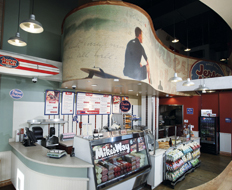At Jersey Mike’s Subs, it’s the little things that make a big difference. The real red wine vinegar used on sandwiches. The freshly sliced meats and cheeses. The store-baked bread and the made-to-order cheesesteaks on the grill.
Jersey Mike’s leaders say those small touches are what set it apart from the world of fast food; it’s not just about offering a cheap meal. The brand isn’t competing in the $5 foot-long arena. Instead, executives say they’re staying focused on the quality of ingredients and service.
“We pride ourselves on being a true, authentic East Coast sub sandwich,” says president Hoyt Jones. “If you taste an Italian sub with real oil and vinegar, you’re just going to know it. There’s a significant difference between freshly sliced meats and meats that are prepackaged.”
Customers seem to be buying into that idea. Jersey Mike’s makes its first appearance on the QSR 50 Contenders list this year, inching closer to the top 50. Its 2012 store count increased by 77 as the brand raked in about $334 million in system-wide sales. Jersey Mike’s is now the third-fastest-growing restaurant chain with sales above $200 million, according to Technomic’s 2013 annual report of the 500 largest U.S restaurant chains.
While it’s making inroads into the sandwich segment, Jersey Mike’s is still miles behind market giant Subway. But even with Subway’s saturation of more than 25,000 U.S. stores, there’s plenty of space for more sandwich chains, especially those that can make a unique pitch, says Kathy Hayden, a foodservice analyst with market research firm Mintel.
“There is room for more sandwich shops,” she says. “But everybody has to have a differentiation. And I don’t think it’s too hard to differentiate from Subway, because it’s pretty basic stuff.”
Opportunities in the sandwich world seem to reflect the recent explosion of the better-burger movement, she says, which found a niche even among burger segment leaders like McDonald’s, Burger King, and Wendy’s.
“Nobody’s going to be at the McDonald’s level, but that doesn’t mean there’s not room in the category,” Hayden says. “I think there’s room for better sandwiches. I think there’s a place to be made when you look at what’s working.”
In some ways, the popularity of Subway could be working in Jersey Mike’s favor, says Jersey Mike’s franchisee Bryan Selden.
“The more that they say that sandwiches are the healthy alternative, the better it is for us. Let them advertise all day long,” Selden says.
Customers are quick to perceive a sandwich—just about any sandwich—as a healthier option than a burger and fries, Selden says. But Jersey Mike’s can offer a higher-quality, fresher sub with premium meats, cheeses, and vegetables.
“Ours is about quality and fresh-prepared everything,” he says. “We never open a bag of lettuce. We do everything.”
Selden’s portfolio includes about 50 units spread across various brands, including Smashburger, Great American Cookies, and Wingstop, in East Texas. He first became interested in Jersey Mike’s after eating there, but he says it was the corporate culture and the potential for growth that sealed the deal.
“Jersey Mike’s is very much a people-oriented business,” Selden says. “We’re like the ‘Cheers’ of the sandwich world, where everybody knows your name. We know what you want and how you like it. We want to be a bright spot in people’s day.”
Industry veterans like Selden—who was shopping for a new franchise in order to expand his business after maxing out his other brands—are responsible for much of the brand’s new growth.
“We’re seeing that a lot across the country,” Jones says. “Other brands that are built out, their franchisees are looking for another great franchise in their portfolio.”
Jones says Jersey Mike’s started targeting these multiunit, multibrand franchisees about four years ago. Since then, they’ve been responsible for much of the company’s new stores. Experienced franchisees are able to propel growth much quicker than single-unit operators, he says. They generally have financing lined up, cash on hand, and the infrastructure and employees in place to get several projects started at once.
“They’re not going into this lightly,” Jones says. “They’ve already decided to do another brand. They’ve already got the people lined up and the money lined up. They’re making the same decision we are.”
The brand that started on the Jersey Shore nearly 60 years ago has spread its presence to 33 states, with plans to open between 125 and 150 stores this year across the country, from Oregon to North Carolina. While Jersey Mike’s growth is happening in multiple markets, Jones says, it’s still measured. And the brand is only heading into areas where it believes it can build a critical mass.
“We kind of made a decision a couple years ago that we wouldn’t go into a new market unless we had multiple development agreements together,” Jones says. “We really weren’t interested in going into a new market with a single franchisee trying to fight the fight themselves.”
To support expansion, corporate has beefed up its real estate, construction, and development departments. And though growth is the current narrative, Jones says, Jersey Mike’s hasn’t forgotten about the quality that put it on the map in the first place. The company rolled out an extensive training program and team that travels the country teaching and reteaching Jersey Mike’s quality and service standards to managers, franchisees, and store employees.
“We’re constantly going back to the basics. It’s not just about growth and building new stores,” Jones says. “We’re constantly going back to those stores. We’re not forgetting about anybody.”
A high store count isn’t the end goal. Jones says executives are focused on unit profitability and don’t envision ever building the kind of density that brands like Subway have.
“We’re not going to grow too fast,” he says. “We call it the 20-mile march sometimes. We want to grow smart and as quickly as we can, but not overextend ourselves.”










